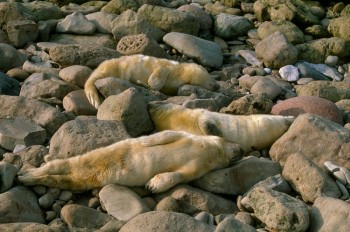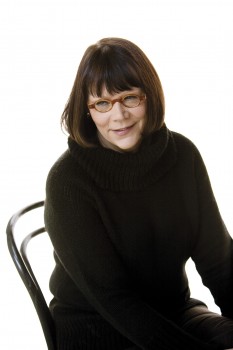Search results for "herbert lomas/www.booksfromfinland.fi/2004/09/no-need-to-go-anywhere"
Brighter than darkness
30 June 2002 | Archives online, Fiction, Prose
An extract from the novel Eksyneet (‘The lost’, WSOY, 2001). Interview by Markus Määttänen
It was a white tiled wall. Too white. Sterile. He wondered how long he had been looking at it. In any case long enough to have forgotten it was a wall. It had changed into a vacuum opening up before him and then shrunk into a tunnel through whose irresistible suction he had hurtled toward the painful images of the past. The past. Yesterday. Almost yesterday. He had stared at the nocturnal entrance, clearly divided in two by the street lamps, and not just that, but now saw only a lifeless and, in its lifelessness, repellant wall. He sighed, rubbed his numb face, pushed himself off the floor and stood up.
Losing it
31 March 2002 | Archives online, Fiction, Prose
An extract from the novel Jalat edellä (‘Feet first’, Otava 2001). Introduction by Kanerva Eskola
Once he had sat in the car for a while Risto could feel his thoughts slowly becoming clearer. Tero had been killed by a lorry. He couldn’t think particularly actively about it but perhaps he could have said it out loud. After all, people often say all kinds of things that they don’t think. Maybe even too often, he wondered and decided to have a go.
‘Tero is dead,’ he said and the words tasted of preserved cherries.
In the changing room at the swimming pool Risto noticed that his swimming trunks and towel were mouldy. He had forgotten to hang them up to dry after the last time he went swimming. That was a thousand years ago and now a bluish grey fur was growing on them. He examined the bitter smelling mould on his trunks; the fur was beautiful, smooth and silky like a rabbit’s coat. He gently stroked his trunks. I can use these for ice swimming, he decided, and began to chuckle quietly to himself.
Mary Bloom
31 December 1983 | Archives online, Drama, Fiction
Introduction by Väinö Vainio
‘Is Mary Bloom about a revivalist religious meeting, a party political conference at which a new leader is born, or a rock concert? These are among the things that have been suggested. I don’t know. I don’t hope for restraint in the imaginations of those who choose.to interpret my work, although I observe it myself. The work of a writer is a part of life, it is an individual and collective experience that seeks, finds, takes and uses its materials like a motor machine. For those who create it the drama is real, as in the theatre, for the duration of the performance.’ Jussi Kylätasku
Characters
Mary Bloom
Martha, a doctor
Otto, a preacher
Disabled veteran
Serenity, his wife
Alcoholic
Cold Cal, a prisoner
Blind man, Deaf Wife More…
The pursuit of happiness
30 June 1996 | Archives online, Fiction, Prose
Extracts from the novella Ilo (‘Joy’, Helsinki Media, 1995)
‘The flower is a characteristic feature of the highest group of the plant kingdom – the flowering plants – and is the name given to the association or organs, more or less leaf-like in form, which are concerned with the production of the fruit or seed.’
Encyclopaedia Britannica, 1910
The encyclopedia made us happy. But what was happiness? That the encyclopedia did not say. You had to set out to look for it. Our exploratory party represented the highest achievements of the field: it would be difficult to find a more serious or committed group.
When we waved to the people cheering on the quay, we were overcome by a strange feeling. It was as if we had already arrived. I made the mistake of speaking my thought aloud.
‘It will all end in tears,’ remarked our welfare officer, Mrs Rose. The atmosphere was ruined. What a pity that our quick-witted Doctor Stratelli was not present at that moment! For it was he who solved the problem of happiness.
Sensitivity session
30 June 1978 | Archives online, Fiction, Prose
An extract from the novel Ja pesäpuu itki (‘And the nesting-tree wept’). Introduction by Pekka Tarkka
Taito Suutarinen knew quite a bit about Freud. Where Mannerheim’s statue now stands, Taito felt that there ought instead to be an equestrian statue of Sigmund Freud. It would be like truth revealed.
Freud, urging on his trusty stallion Libido, would be clad from head to foot in sexual symbols – hat, trousers, shoes: one hand thrust deep into his pocket, the other grasping a walking-stick. The stick would point eloquently in the direction of the railway tracks, where the red trains slid into the arching womb of the station.
Taito had also attended a couple of seven-day sensitivity training courses, where people expressed their feelings openly, directly and spontaneously. By the end of the first course Taito was so direct and spontaneous that he couldn’t get on with anybody. By the end of the second he was so open that everyone was embarrassed. Every member of the group had cried at least once, except the group leader. Never before had Taito witnessed such power. He could not wait to found a group of his own. Taito’s group met in a basement room, where they reclined on mattresses to assist the liberation process. Everyone was free to have problems, quite openly. You were not regarded as ill: on the contrary, if you realized your problem you were more healthy than a person who still thought he mattered. Moreover, as Taito, fixing you with his piercing gaze, was always careful to emphasize, every problem was ultimately a sexual problem. Taito would spontaneously scratch his crotch as he spoke, making it clear that he himself had virtually no problems left. More…
Leave and stay
19 December 2011 | Fiction, poetry
Butterflies, metamorphoses, burial and remembering are the recurrent images in Henriikka Tavi’s third collection, entitled Toivo (‘Hope’). Introduction by Mervi Kantokorpi
Poems from the collection Toivo (‘Hope’, Teos, 2011)
Mourning cloak
I will tell you, though you cannot hear it.
This is a story that you will come to forget.
I have gone, but there is no departure. And as
the meadow of absence begins to lapse into grief:
Do not grieve.
I was here a moment ago and
soon will be between the dermis and the epidermis.
I stand in a row behind myself; I am a memory of you.
Oh, you weak spark! You powerful
desire to turn into a fortune!
You were the crowd in my head.
I am serious, you only imagine me.
Don’t disappear. Leave and stay.
I’ll be no further than this. More…
Sealspotting
14 June 2009 | Reviews

Zzzzzzz! In the grey seal kindergarten babies take a nap after dinner. – Photo: Seppo Keränen
Taskinen, Juha
Paluu Saimaalle
[Return to Lake Saimaa]
Helsinki: WSOY, 2009. 204 p., ill.
ISBN 978-951-0-33745-5
€ 38.90, hardback
Keränen, Seppo & Lappalainen, Markku
Hylkeet [The seals]
Helsinki: Maahenki, 2009. 151 p., ill.
ISBN 978-952-56-5266-6
€ 45, hardback
Sälar
Helsingfors: Söderströms, 2009.
151 p., ill.
Swedish translation: Annika Luther
ISBN 978-951-52-2603-7
€ 45, hardback
The private life of the species of seal that lives only in Lake Saimaa has been carefully investigated lately. Almost everything about this highly endangered species has been revealed, thanks to technological devices such as transmitters that can be glued to their backs…
STOP! WARNING: as I realise that not everybody wants to know what pinnipeds do in their spare time, I suggest you quit reading now, if you aren’t interested in the lives and fates of an obscure group of about 260 mammals that live in a lake in the remote west of Finland.
The son of the chimera
30 September 1999 | Fiction, Prose
A short story from Pereat mundus. Romaani, eräänlainen (‘Pereat mundus. A novel, sort of’, WSOY, 1998)
I was born, but not because anyone wanted it to happen. No one even knew it was possible, for my mother was a human being, my father a chimera. He was one of the first multi-species hybrids.
Only one picture of my father survives. It is not a photograph, but a water-colour, painted by my mother. My father is sitting in an armchair, book in hand, one cloven hoof placed delicately on top of the other. According to my mother, he liked to leaf through illustrated books, although he never learned to read. He is wearing an elegant, muted blue suit jacket, but no trousers at all. Thick grey fur covers his strong legs, right down to his hoofs. Small horns curve gracefully over his convex forehead. Striking in his face are his round, yellow eyes, his extraordinarily wide mouth, his tiny chin and his surprisingly large but flat nose. More…
Back to the sources
23 October 2014 | Essays, Non-fiction, On writing and not writing
In this series, authors discuss the difficulties of their trade. Jari Järvelä finds it difficult to stop gathering source material which then gets piled in towers on his desk and in sacks around it. He knows that it’s got to stop though – for when it does, the stories will finally emerge, and life is a bliss… for a moment
When I was younger I thought that writing a novel began with the moment when I sat down at my desk and pressed a key for the first time. A. Hmmm…no, H. No, let’s make that S. No no no, I need a more original beginning…Z!
That’s not the case. The writing of a novel begins between two and twenty years before the choice of the first letter and the first word. Sometimes longer.
In the case of my novel Särkyvää (‘Fragile’, 2014), I know the exact moment of its birth.
Before I began to make a career as an author, I spent a year as a teacher at Hamari school in Porvoo. It was the beginning of the 1990s. Hamari was an old sawmill community on the sea, full of wooden houses more than a century old and motor boats put-putting toward the horizon. The headmaster looked more like a sea dog than a teacher; one morning he announced that it was his fortieth birthday. After that he sat down on the staff-room sofa, fell into deep thought and suddenly ejaculated, ‘Why the hell does a person have to gather so much junk in their life?!’ More…
Like it, or else
23 January 2014 | Non-fiction, Tales of a journalist

Illustration: Joonas Väänänen
Hitting the ‘like’ button is not only boring but also working its way from Facebook deeper into society, says Jyrki Lehtola. Surely there must be some other way of solving the world’s problems?
At the end of the autumn the theatre critic of the Helsingin Sanomat newspaper panned Sofi Oksanen’s stage adaptation of her novel Kun kyyhkyset katosivat (‘When the doves disappeared’, 2013).
That’s life. Artists struggle with their projects, sometimes for years. Then a critic takes a glance at the result and crushes it in a matter of hours.
Then there’s a huff about unfairness, the use of power and all the things artists blow off steam about when they feel that their creations have been treated unfairly. The debate is held between injured authors and sometimes the critic, but generally few others participate, and just as well. More…
And he left the road
30 June 1983 | Archives online, Fiction, Prose
Three short stories from Maantieltä hän lähti (‘And he left the road’). Introduction by Eila Pennanen
And he left the road
And he left the road, walking straight ahead across fields and ditches, past barns and through bushes growing in the ditch. From the fields he went on to the forest, climbed a fence, walked past spruce and pine, juniper bushes and rocks, and came to the edge of a forest and to the swamp. He crossed the swamp, going through small groves of trees if they happened to be in his way. He went on walking rapidly across rivers, through forests, over seas and lakes, and through villages, and finally he came back to the very spot from which he had started walking straight ahead.
In the same way he walked at a right angle to the direction he had first taken and after that, a few times between those two directions. Every time he would start from the road and in the end would always come back to the road in the same direction as when he’d started off. On his rounds, after walking a bit, he would stop and look up every now and then, and each time he looked he would see the sky and sun or the moon and stars. More…

